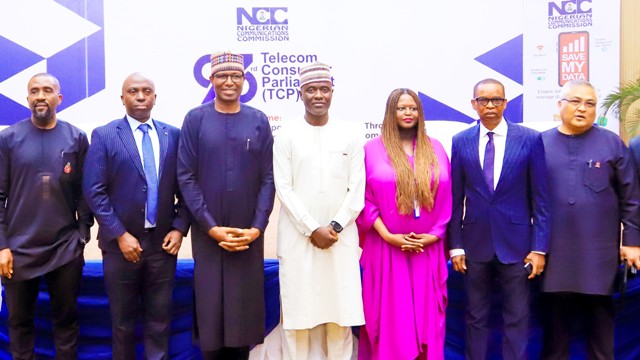Why your data is depleting so fast – NCC Boss

Spending an hour on Instagram can set you off an average of 600 Megabytes of your data, while streaming platforms like YouTube would set you off by about 3.5 to 5.4 Gigabytes per hour…, while viewing a photo on Instagram might have required only 100 kilobytes of data five years ago, today, with advanced camera resolutions, a photo can consume between two to four megabytes when opened on Instagram
Emmanuel Thomas I Friday, November 08, 2024
ABUJA, Nigeria – The Nigerian Communications Commission, NCC has explained the reasons behind fast depletion of data in gadgets used by consumers of services offered by Mobile Network Operators, MNOs.
Executive Vice Chairman and Chief Executive Officer of the NCC, Dr. Aminu Maida who was speaking on the subject, “Optimizing Data Experience: Empowering Consumers through Awareness and Transparency in a Consumer-Centric Telecom Industry’ at the 93rd Telecoms Consumer Parliament, TCP in Abuja, attributed some of the reasons to the advent of 4G and 5G, as well as devices with ultra-high-definition screens.
“For example, while viewing a photo on Instagram might have required only 100 kilobytes of data five years ago, today, with advanced camera resolutions, a photo can consume between two to four megabytes when opened on Instagram”, he said.
Quoting a Tech Advisor, an online resource that offers tech reviews, he averred that, ‘spending an hour on Instagram can set you off an average of 600 Megabytes of your data, while streaming platforms like YouTube would set you off by about 3.5 to 5.4 Gigabytes per hour’.
Maida explained that improved technologies go beyond their purchase cost to the consumers’ pockets.
“They also come at a cost to data. Because they have better screen resolutions, they consume higher quality media that consumes more data. This is the same for our increasing digital habits”, he said, noting that DataReportal, already made it clear that the world’s internet users are spending less time watching television.
“The average daily television viewing has fallen by over 8% in the past one year. These viewers are now spending more time on their telephones, tablets, and smart TVs streaming programmes that they would previously have watched on broadcast television.
He explained that in recognizing these challenges, the commission, in collaboration with major operators, launched a Joint Industry Campaign on Consumer Awareness on Smarter Data Usage, adding that the media campaign, spanning radio, television, newspapers, and SMS, aims to educate consumers on effective data management.
“ I am sure many of you have encountered jingles or graphics offering tips for managing data. Our message emphasizes empowering consumers with the knowledge to optimize their data usage. For example, many smartphone users may not know that their devices can track data usage and allow them to set limits on the amount of data they want to use”, he said.
Quoting DataReportal, Maida said there are now over 5 billion internet users globally with Nigeria alone accounting for 132 million connections.
“Nigerians spend an average of 4 hours and 20 minutes on social media daily, far above the global average, underscoring how deeply embedded digital interaction is in our lives”, he said, adding “in 2024, Nigeria’s daily data usage averaged 336 gigabytes per second, making a 39% increase from the previous year—a clear indication of the data-driven lifestyle many Nigerians lead”.
Maida told the gathering that over the past months, data analysis has shown that quality service delivery is not solely the responsibility of Mobile Network Operators but that it requires collaboration across the value chain.
He said key stakeholders, such as TowerCos, which provide power and shared infrastructure, as well as those providing essential backhaul services, whether by fibre, microwave or even satellite, connecting base stations to the core networks of MNOs, all play crucial roles in ensuring high-quality telecom services. He said that recognizing this has forced the NCC to revise its guidelines to include provisions that hold each player in the value chain accountable for quality service.

